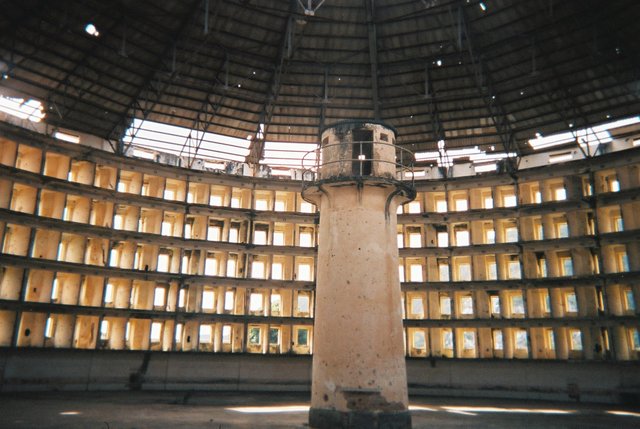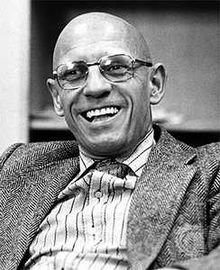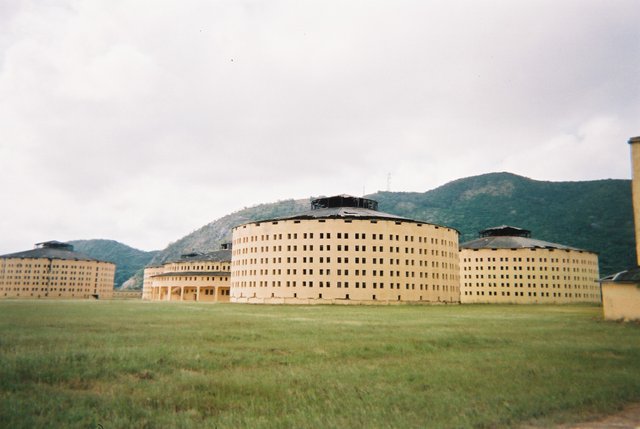The Dialectics of Liberation: Anarchism, Existentialism, and Decentralism.
Part 2 - The Short History of Existentialism: VI- Post Structuralists - Michel Foucault
"Language is a Misfit" - charlie777pt
1- Introduction
"Where religions once demanded the sacrifice of bodies, knowledge now calls for experimentation on ourselves, calls us to the sacrifice of the subject of knowledge." - Michel Foucault
Post-structuralism emerged in France in the 60's, mostly by philosophers and literary critics, with the help of the new linguist theories (Ferdinand de Saussure) , the structuralist anthropology (Claude Lévi-Strauss ), and deconstructionism (Jacques Derrida), allowing the connection of the speaking subject as the structured medium, involved within an invisible power that constraint the word as a veil to reach truth and reality.
Structuralism is a sociological and anthropological systematization of thought, based on the idea that culture is built in a field of forces hidden in the power dynamics, that inadvertently bend people to the centralized hierarchical systems.
These systems have the structuralist property of the concept of binary opposition constituted by a polarity of the constraints leading human behavior ( like good and evil, up and down).
The movement of 1967 by the Provos in Holland and the 68 uprisings of Prague and Paris were the expressions of the existentialist movement, working like a living philosophy on the streets, showing how mere literary thoughts can become action and social intervention of workers, students, and citizens concerned with freedom.
“Where there is power, there is resistance.” - Michel Foucault
Structuralism brought the awareness of the Institutional power dominant structures, like the Repressive States Apparatuses (RSA's) - military, police, and justice system- and the ideological state apparatuses (ISA's) - family, school, church and mainstream media.
These invisible forces influence the sources of meaning, objectives, and actions of our existence in Reality, that feed and obfuscate most people's truths, thoughts, and purpose for life.
For Post-structuralism, subjects and structures are like the egg and the chicken paradox (none comes first, they are just one undissolvable system) and we can't find the distinction between the structure and its genesis, and maybe essence and existence are abstract inseparable entities.
Post-structuralism rethinks the separations between subject and structure joining them in one concept that is called "practices."
Post-structuralism came as a result of this revolt against economic exploitation, to bring a new vision for open social and personal relationships free of social determinism.
The movement also included authors like Jacques Lacan, Michel Foucault, Roland Barthes, Emmanuel Levinas, Julia Kristeva, and many others.
All the post-modernist thinkers and post-structuralists such as Foucault, Derrida, Lacan, Deleuze, Guattari and Jean-Francois Lyotard, contributed to the dialectics of human liberation with their vision against power and authoritarianism, and they rejected the rationalist analysis of the western world thinking.
"I like everything that is strange to me: I like what stimulates, shocks or terrifies me." - Henry Miller in Reflections on the death of Mishima
|
“Maybe the target nowadays is not to discover what we are but to refuse what we are.” - Michel Foucault
Foucault was more like a voyeur that was more interested in unmasking reality, than finding solutions to solve it.
Noam Chomsky is more concerned with the ways to change and act against power always with a more consistent view within the frame of intervention in the social order, while Foucault is focused on the metaphysical analysis of power as an observer that does not interfere.
“The individual is the product of power.” - Michel Foucault
Foucault clearly rejects humanism by demonstrating that the individual is not own his/her essence, or maybe it does not exist in the traditional sense, because people do not construct themselves, they are built, we do not produce but we are being produced and we are not an implication but a causality.
Foucault is more a poststructuralist and he denied structuralism, besides that his concept of disciplinary power is borrowed by structuralist ideas that he challenged in the notions of binary opposition to form meaning, but maybe they are correlative with his definitions of power and knowledge.
Michel Foucault the innovated the theories of Power as an ubiquity and maybe a perpetuity, with its undefined web of diffusion and have straight relations with knowledge
3- The Panopticon - the metaphoric view of actual society
Most people today love total visibility and world exposition, but they don't know the line between private and public and they do not question the contemporary surveillance at all the levels of our social lives, well described by Georges Orwell.
The power of today wants to totally eliminate privacy, as the main form of domination..
“Visibility is a trap.” - Michel Foucault, Discipline and Punish: The Birth of the Prison.
Foucault used a model based on the idea of the panoptic concept, which was designed by Jeremy Bentham (1748-1832) as a prison mechanism and architecture applicable to absolute control of the prisoner behavior.
![]()
Source: Wikipedia - Elevation, section, and plan of Jeremy Bentham's Panopticon penitentiary, drawn by Willey Reveley, 1791
The philosopher Jeremy Bentham was the initiator of utilitarianism and a was voluntarist, that started to question of the separation the powers of Church and State, individual rights for freedom of speech and action, but at the same time, he wanted governments to build this kind of prisons, factories, schools, and hospitals.
Later he experimented with a kind of reversed panopticon theory, where politicians should be in the cells and the public watching them - the perfect transparency. :)
Bentham's Panopticon is used by Foucault to make us aware of the concepts and the processes of surveillance for the control of the masses.
Today the Panopticon is the invisible interface of power controlling our lives, and everybody should know it, because there were enough whistleblowers, from Julian Assange and Leaks, The Snowden revelations, Panama leaks, just to mention some people and acts that we should venerate and defend.
The "Panopticon" is an experiment about power disciplining and manipulating individual behavior, as an artifact made for surveillance and control, to generate what Foucault called a “disciplinary society,” exercising oppression to generate social immobilism and bend people's characters.
Michel Foucault sees the panopticon prisoner subjected to the power of surveillance and can't even see the guards that can't fear retaliation, like he says “He is seen, but he does not see; he is an object of information, never a subject in communication.”
The Panopticon, is a building, with a tower in the middle that has perfect visibility over each cell, a prisoners trap, where they can be seen but you can't communicate with each other or with the authorities exercising the disciplinary power.
“Surveillance is permanent in its effects, even if it is discontinuous in its action.” - Michel Foucault, Discipline and Punish: The Birth of the Prison.
Foucault's Panopticon warns of the interference of power, in the self-control of the person, due to the presence of surveillance systems.
Michel Foucault's panoptic theory wants to reveal the political and economic power that controls us, without being able to perceive it.
"My objective . . . has been to create a history of the different modes by which, in our culture, human beings are made subjects." - Michel Foucault
4 - Prison Model of the Panoptikon
The now-closed prison called "Presidio Modelo"(Model Prison) in Isla de la Juventud (Cuba) where Fidel Castro was imprisoned in 1953.
Outside:
Inside:

There are other Post-Structuralist authors that I would like to have include with one post for each like the writer, literary critic, semiotic expert and philosopher Umberto Eco (1932 - 2016), the philosopher,writer on film, and art, Gilles Deleuze (1925 - 1995), sociologist and philosopher, writing in cultural theory, Jean Baudrillard (1929 - 2007).
We still have some Post-Structuralist authors that are actually alive like philosopher and gender theorist Judith Butler (1956 - ), and philosopher, psychoanalyst, and feminist Julia Kristeva (1941 - ).
Any way I will try to bring them up in the remaining articles of the series.
I also didn't have the opportunity to share the part of the cinematic Post-structuralism, so I leave here the movie Memento that shows a lot about this part of the movement. The known Matrix trilogy is considered a poststructuralist and reality deconctruction movie.
Short Videos: Philosophy - Michel FoucaultLong Videos: Memento complete movie
Notice that Chomsky does not feel comfortable with the debate and refuses to speak English, but even that couldn't save his insecurity, but he could express his points of view.
Debate Noam Chomsky & Michel Foucault - On human nature [Subtitled]
The Dialectics of Liberation: Anarchism, Existentialism, and Decentralism. Published Posts:
Introduction to the Dialectics of Liberation: Anarchism, Existentialism and Decentralism
I - Anarchism
- What is Anarchism?
- The History of Anarchism
- Part 1 - Pre-Anarchy - Social Revolution
- Anarchy: Revolution Against The State
- Anarchy Today
- Index and Conclusions of part 1 - Anarchy
II - Existentialism
- What is Existentialism ?
- Part 1 - Unplugged Introduction to Existentialism
- Part 2 - The Short History of Existentialism: I - Early Pre-existentialism
- Part 2 - The Short History of Existentialism: II - Pre-Existentialists
- Part 2 - The Short History of Existentialism: III - Phenomenology - Brentano to Husserl
- Part 2 - The Short History of Existentialism: III - Phenomenology - Jaspers to Sheller
- Part 2 - The Short History of Existentialism: IV - Humanistic Existentialists - Buber, Arendt, and Tillich
- Part 2 - The Short History of Existentialism: V - Humanistic Existentialists - Rollo May
- Part 2 - The Short History of Existentialism: V - Humanistic Existentialists - Abraham Maslow
- Part 2 - The Short History of Existentialism: VI - Post -Structuralism - Jacques Lacan
- Part 2 - The Short History of Existentialism: VI - Post -Structuralism - Michel Foucault - This post
Next posts on the Series:
II - Existentialism(Cont.)
- What is Existentialism ? (Cont.)
- Part 2 - The Short History of Existentialism: VI - Post -Structuralism - Emmanuel Levinas
- Part 2 - The Short History of Existentialism: VI - Post -Structuralism - Jacques Derrida
- Part 2 - The Short History of Existentialism: VI - Post -Structuralism - Paul Ricouer
- Part 3 - The Philosophy of Existentialism: I - The Meaning of Nonsense
- Part 4 - The Fear of Freedom of Erich Fromm
- The "Existentialists"
- Part 1 - The Players and the Times
- Part 2 - Jean Paul Sartre - the Man of The 20th Century
- Humanism and Existentialism
- Existentialism and Anarchism
- The Future : Posthumanism, transhumanism and inhumanism
III - Decentralism
- What is Decentralism?
- The Philosophy of Decentralism
- Blockchain and Decentralization
- Anarchism, Existentialism, and Decentralism
IV - Dialectic for Self-Liberation
- The Dialectics of Liberation Congress
- Psychedelics, Libertarian and artistical movements
- Psychoanalysis and Existentialism
- The Anti-psychiatry movement
 2 - Michel Foucault (1926-1984)
2 - Michel Foucault (1926-1984)
$rewarding 50% 15min
Downvoting a post can decrease pending rewards and make it less visible. Common reasons:
Submit
Thanks a lot my dear friend for your support, and for this bot introduction.
Always learning by using google translator to read your posts. :)
I love your wandering around the World.
Some lyrics came into my mind when writing this comment.
It would make a hit. hehe
I wanna be your drone
Don't need to be near you
But I can always see what you see.
..... and it goes on
Hehe
Keep on droning the world.
Cheers
Downvoting a post can decrease pending rewards and make it less visible. Common reasons:
Submit
You are super knowledgeable, I can learn a lot from you ^^
Posted using Partiko iOS
Downvoting a post can decrease pending rewards and make it less visible. Common reasons:
Submit
amazing psychology friend,i like philosophy @charlie777pt
Downvoting a post can decrease pending rewards and make it less visible. Common reasons:
Submit
Este post recebeu 5.00% de upvote da conta @steemitportugal!

Obrigado por fazeres parte da comunidade @steemitportugal .
Downvoting a post can decrease pending rewards and make it less visible. Common reasons:
Submit